31 Best Work Hacks for Getting More Done Quicker

Everyone wants to get out of work early. Our goal, day in and day out, is to complete our tasks so we can enjoy life outside of the office. Unfortunately, scrolling TikTok or online shopping isn’t going to move up your quitting time. But there are some little things you can do to get all of your professional responsibilities taken care of in record time, whether you work from home or head into the office. We’ve collected a ton of helpful work hacks that can help you get more done quicker. Keep reading to learn the best tips from business coaches, CEOs, and productivity studies.
READ THIS NEXT: Doing This at Night Can Boost Your Memory, New Study Says.
The Best Work Hacks for Getting More Done Quicker
1. Be an early bird.

The most successful people get up early. Apple CEO Tim Cook, Starbucks executive chairman Howard Schultz, Twitter CEO Jack Dorsey, and Virgin founder Richard Branson are all up before 5 a.m.
“No matter where I am in the world, I try to routinely wake up at around 5 a.m.,” Branson previously told Inc. “By rising early, I’m able to do some exercise and spend time with my family, which puts me in a great mind frame before getting down to business.”
Casey Jones, founder and director of global digital marketing company CJ&CO, recommends waking up early and dedicating that first hour to self-care. “Meditate, exercise, and practice positive affirmations. The idea is to relax your mind and body to supercharge them for the entire day.”
2. Turn on the light first thing in the morning.
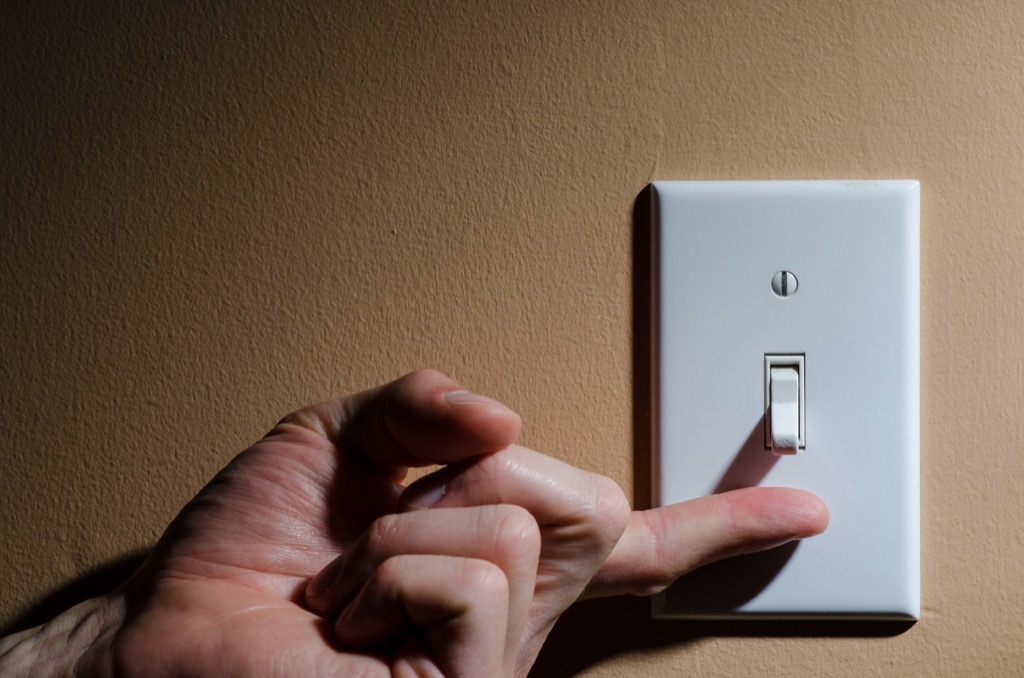
Light—be it natural or artificial—tells the brain that the day has begun and sends signals to the body to stop producing melatonin, the sleep hormone.
“For productivity, daytime light or bright light with cooler tones help signal to your body that it’s time to be alert and ready to focus,” explains Robert Soler, co-founder of SkyView Light and former advisor to NASA on circadian lighting. He likens this to the fact that you may feel happier and more productive on a day with a clear blue sky than one that’s overcast.
3. Invest in circadian lighting.
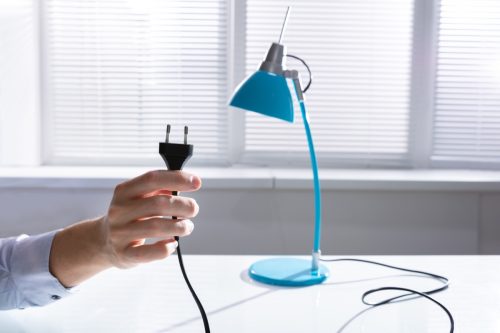
Those harsh fluorescent bulbs in your office may be negatively affecting your work performance, according to Soler, who says it’s important to invest in circadian lighting that mimics the sun and the sky. “You want to look for a gradient that incorporates different light temperatures as well as the blue reflection of the sky.”
He points to a 2022 study published in PLOS Biology that showed such lighting had “beneficial effects on self-reported alertness, performance, mood and improved cognitive performance and higher-order decision making” on daytime office workers. It also showed improved “measures of concentration and reading comprehension” in students.
4. Start your day with a cold shower.

Cold showers can instantly make you more alert, readying you for your tasks ahead. “Cold water exposure has been shown to release endorphins, which are natural painkillers and mood-enhancers,” Alex Trevatt, MD, who works as clinical lead at Avon Aesthetics and runs the medical education company Medistudents, previously told Best Life.
Other possible benefits of a cold shower include increased attention, a stronger immune system, and improved circulation.
5. Use the Pomodoro Technique.

If you’ve never heard of the Pomodoro Technique, you’ll want to learn about it now, as the majority of the experts with whom we spoke recommended it for better productivity.
This time management technique was created by Francesco Cirillo in the 1980s, named after the Italian word for tomato as he was inspired by the popular-at-the-time tomato-shaped kitchen timers.
Here’s how it goes: Step One—work like your life depends on it for 25 minutes; step two—kick back and relax for five minutes; repeat this for four cycles; then chill for a whole 15 minutes.
The idea is that this technique “can help prevent burnout and fatigue,” explains Andrei Vasilescu, CEO and founder of DontPayFull.com. “It’s especially useful when dealing with tedious or complex tasks that require intense concentration or creative thinking.”
READ THIS NEXT: 5 Things You Should Never Lie About on Your Resume.
6. Implement the Eisenhower Matrix.

Another popular technique cited by experts is the Eisenhower Matrix, also known as the Urgent-Important Matrix. It divides tasks into four categories: Urgent and Important, Not Urgent but Important, Urgent but Not Important, and Not Urgent and Not Important.
Karina Konkova, chief communications officer at developer MY.GAMES, describes it as a “simple but powerful tool that can help you make better decisions about how to use your time and achieve your goals more efficiently.” She notes that it can be helpful to use the Eisenhower Matrix for both work and personal tasks.
7. Follow the Two-Minute Rule.

We tend to put off the small stuff, but productivity pros swear by the Two-Minute Rule. It’s the idea that if a task takes less than two minutes to complete, you should do it immediately. It’s the ultimate way to avoid procrastination.
Juliet Dreamhunter, a certified goal success coach and founder of Juliety, says she likes to step it up by setting a 30-minute timer and seeing how many under-two-minute tasks she can complete within the half-hour.
8. Start timeboxing.

Another time-management technique Dreamhunter likes is timeboxing, which she says is especially helpful if you’re a perfectionist who tends to spend too much time on unnecessary details.
“In simple terms, the idea is to give a set amount of time to each task, making sure you stay focused without going over the time you planned,” she explains. “When the time is up, you STOP and move on to the next thing. It’s an awesome way to avoid rabbit holes, save time and get more done.”
9. Create templates when possible.
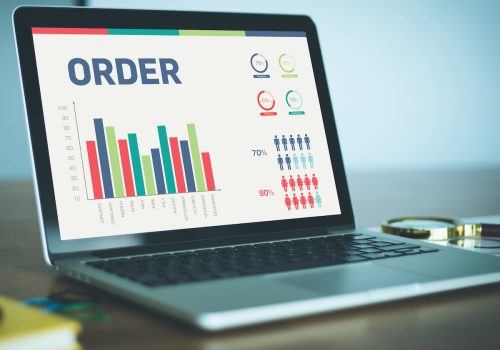
You may not realize how much time you’re wasting teeing up simple, repetitive tasks time after time. This is why David Bitton, co-founder and CMO at DoorLoop, a real estate property management software, suggests creating templates whenever possible. Not only will this save you time, but it decreases the chances you’ll make an error.
“Build chat templates whenever you require a project status report or an update, create email templates for different scenarios, and develop templates as a starting point for presentations,” he says.
10. Implement batch days.

Chelsea Clarke, founder and CEO of HerPaperRoute, an entrepreneurship blog, podcast, and school, says she recommends implementing batch days for her clients. These are days when you only focus on one task and do it in bulk.
“Examples of tasks that I batch are writing blog posts, scheduling social media, and creating lessons for my courses,” Clarke says. “Batch days are a huge productivity hack because you save brainpower and energy when you’re not having to constantly switch between tasks.”
For more career advice delivered straight to your inbox, sign up for our daily newsletter.
11. Stop multitasking.

For years, being a great multitasker has been considered a badge of honor—but that’s likely counterintuitive.
“Single-tasking, doing one thing at a time, is faster and less error-prone than attempting to multitask,” says time management and productivity coach Alexis Haselberger. In fact, she points to a 2006 study by the American Psychological Association that showed multitasking reduces productivity by up to 40 percent.
12. Do the hard stuff first.

Some work tasks are more daunting, challenging, and unpleasant than others. Though it may not be your instinct, those are the things you may want to do first.
“Your motivation and desire for intense action typically peak between 10 am and 2 pm,” says Jocelyn Michelle Reaves, business consultant and coach and founder of CoachedIt. “Try to tackle your cumbersome tasks early to midday while your creativity is strong. Knocking them out early will also give you a strong sense of accomplishment and the motivation to keep the ball rolling with other tasks.”
13. Or do the hard stuff when you’re most energetic.

Not everyone is at their most productive first thing in the morning, shares Risa Williams, a clinical psychotherapist and time management coach. In her book The Ultimate Time Management Toolkit, she introduces the Task Intensity Meter technique, in which one finds the times of day when they have the most mental energy.
“The goal would then be to do the higher-intensity tasks when you feel like you have the most mental energy each day to do them and to space them out and give yourself breaks to reset your brain and energy in between,” she explains.
14. Download productivity tools.

Digital productivity tools abound today, so whether you need help prioritizing tasks, scheduling out your day, or assigning work to your staff, there’s likely a fit for you.
Jeremy Reis of Explore Startups recommends task management tools such as Trello and Microsft OneNote. Other popular applications include Asana, Todoist, and Monday.
15. Set up a comfortable workstation.

“It’s a simple, but important concept: If you are feeling discomfort while at your workstation or desk, you will get less done,” says Mike Pace, wellness and productivity expert at Contour Design.
Some basic tips are to sit up straight, stretch when you’re feeling tight or sore, and ensure your chair is at the right level for your desk. There are also plenty of ergonomic options these days, from computer mice designed to put less stress on your wrists to chairs that take pressure off your back. Take the time to find what works for you.
READ THIS NEXT: Never Accept a Job Without Doing This First, Experts Warn.
16. Stand, don’t sit.
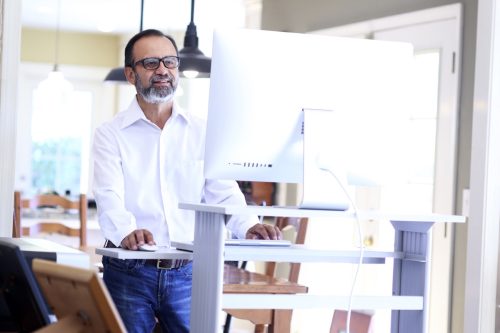
Along the lines of ergonomic office furniture are standing desks. In 2016, research from the Texas A&M Health Science Center School of Public Health found that standing desks may boost productivity.
“The researchers examined the productivity differences between two groups of call center employees over six months and found that those with stand-capable workstations—those in which the worker could raise or lower the desk to stand or sit as they wished throughout the day—were about 46 percent more productive than those with traditional, seated desk configurations,” explained Texas A&M Today.
17. Reduce eyestrain.

Pace also points to how the setup of your workstation can affect your vision. He says your sight line should be level with the top third of your monitor, and your monitor should be an arms-length in front of you. Not only will this reduce neck and shoulder pain, but Pace says it will reduce eyestrain, which can cause “focus issues and headaches.”
Pace also recommends abiding by the 20/20/20 rule. “Every 20 minutes of screen time, take 20 seconds to look at something 20 feet away,” he explains. “This seems counterintuitive to productivity, but trust me, in the long run, this helps prevent eyestrain and headaches, both of which are productivity poison.”
18. Find time to exercise.

A lot of successful people will tout the benefits of exercising first thing in the morning, as it boosts your energy and sets you up for the day. But if that’s not possible within your schedule, a 2008 study published in the International Journal of Workplace Health Management found that office workers who had access to and utilized a company gym during the day were ultimately more productive.
According to the Harvard Business Review, the study showed that on days they visited the gym, participating employees “reported managing their time more effectively, being more productive, and having smoother interactions with their colleagues.”
19. Don’t resist breaks.

“When you feel unfocused, don’t double down and try to force yourself to focus,” says Haselberger. “Instead, take a short break.”
She recommends reading a chapter of a book, taking a walk around the block, or getting a cup of coffee. “When you return to your desk, you’ll feel much more focused and ready to work than if you had spent those 10 minutes trying to force yourself into focus.”
20. Eat lunch with coworkers.

If you work in the office, eating lunch with your coworkers (yes, say goodbye to your sad desk salad!) can help boost productivity. In a 2016 study published in Human Performance, researchers found that firefighters who ate lunch together in the firehouse had better work performance.
“Our findings establish a basis for research and practice that focuses on ways that firms can enhance team performance by leveraging the mundane and powerful activity of eating,” explain the researchers.
READ THIS NEXT: The 3 Words You Should Never Use in an Email, Experts Say.
21. Make every day “bring your dog to work day.”

A 2017 study published in the International Journal of Environmental Research and Public Health looked at the effects of dogs in the workplace. It found that employees who were allowed to bring their dogs into the office were less stressed and reported more job satisfaction.
So, if Fido is welcome in your office, consider bringing him. And if you work from home, more reason to adopt that dog you’ve been thinking about!
22. Dress for success.

Whether you’re working at home or going into the office, dressing professionally will make you feel more competent and in control, says Mason Donovan, author of The Golden Apple: Redefining Work-Life Balance for a Diverse Workforce.
In fact, a 2015 study published in the Journal of Experimental Social Psychology found that when participants were asked to complete tasks, those dressed more formally engaged in the kinds of abstract thinking that someone in a position of power would typically use.
23. Use your commute time wisely.

According to the U.S. Census Bureau’s 2017 American Community Survey, the average American’s commute is about 27 minutes. And it’s up to you to use that time productively.
If you take public transportation or are part of a carpool, Brian Munce, co-founder and managing director of Gestalt Brand Lab, suggests responding to emails or reading through a new report. “Both are time-consuming but simple tasks you can accomplish before even entering your office.”
If you drive to work, Munce recommends listening to e-books or podcasts that can further your professional development. If you walk, he says you can even dial in to meetings or calls.
24. Listen to binaural beats.

WebMD defines binaural beats as “an illusion created by the brain when you listen to two tones with slightly different frequencies at the same time.” These can slow down your brain waves and help you feel more relaxed.
People commonly use binaural beats to help them fall asleep, but the calming effect has also been shown to increase work productivity.
As Healthline explains, it’s all about the frequencies you choose. “Binaural beats in the lower beta frequencies (14 to 30 Hz) have been linked to increased concentration and alertness, problem solving, and improved memory… Binaural beats of 40 Hz were found to be helpful in enhancing training and learning, according to a 2020 study.”
25. Wear noise-canceling headphones.

Whether you have chatty colleagues or you’re working from home where your kids are running around, background noise can be very distracting. If you like to listen to music, invest in a pair of noise-canceling headphones.
Stacy Ennis, best-selling author, speaker, and success and book coach, says she prefers a simple pair of earplugs to drown out the noise and have the quiet she needs to work.
READ THIS NEXT: This Is What People Hate Most About Their Boss, Survey Shows.
26. Limit email use.
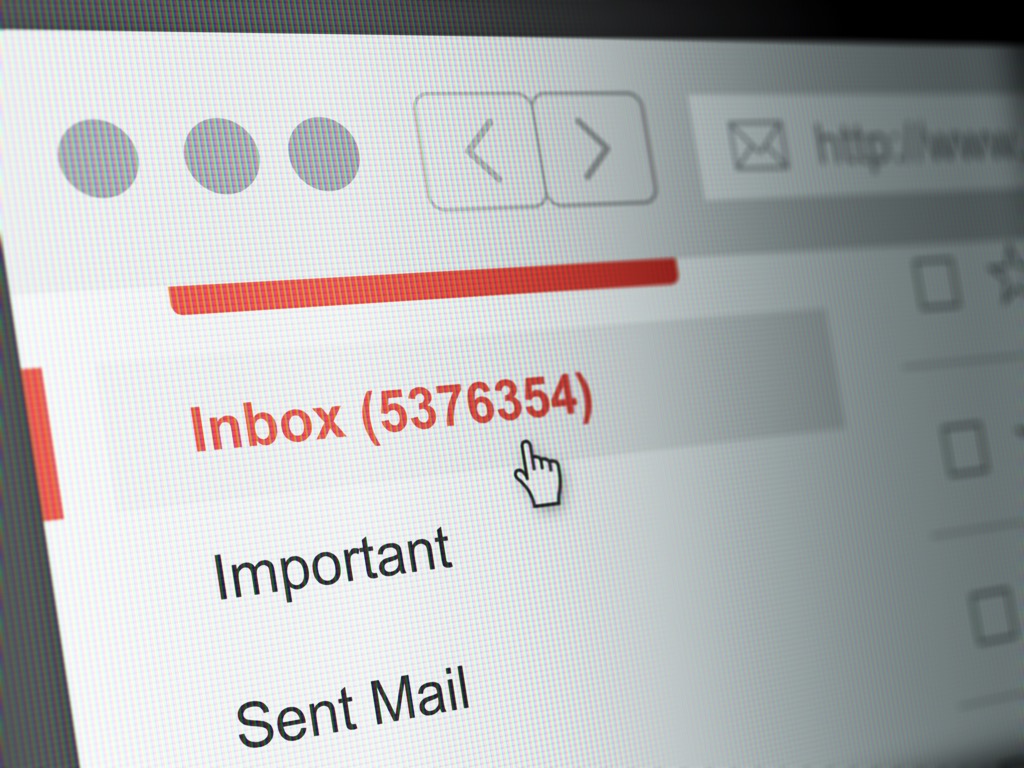
Email is pivotal for most jobs, but if you can, it’s best to avoid reading and responding to emails as they come in.
Instead, choose three times a day to email: once first thing, once before lunch, and once more before finishing up your workday. One 2015 study published in Computers in Human Behavior had participants do this, and they “experienced significantly lower daily stress.”
27. Turn off notifications.

“Some of the most common distractions are the pings and dings from our phones and computers, so one of the biggest levers we have is to reduce or remove our notifications, or silence your phone, or use Do Not Disturb,” says Haselberger. This applies to your smartwatch, too!
Haselberger cites a study conducted by the University of California, Irvine that shows it takes an average of 23 minutes to refocus after a person is distracted. By this logic, “most people spend about one-third of the workday simply recovering from distractions,” she says.
28. Reduce social media use.
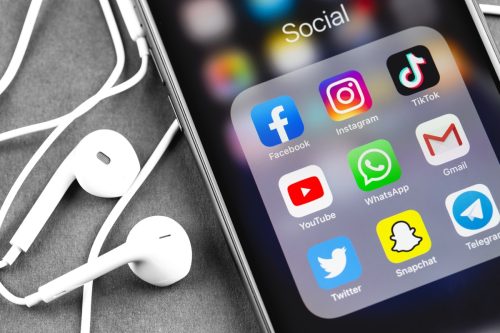
In addition to serving as a distraction, looking at social media can have other unintended consequences, according to Jones, who says platforms like Facebook and Instagram can affect your attention span.
“For example, if you scroll through your Instagram feed for two minutes, you’ll consume more than 50 pieces of varying information, something that you don’t really need,” Jones explains. “Social media trains your brain to have a shorter attention span and be impulsive. As a result, you won’t be able to focus on something for more than five minutes, which is a big problem.”
29. Keep meetings to 25 minutes.

We’ve all been there. You’re in a meeting that should’ve been relatively straightforward, and suddenly, someone goes off on a tangent. All of sudden, you start to sweat thinking about all the things that aren’t getting done.
In her book The 25 Minute Meeting: Half the Time, Double the Impact, Donna McGeorge advocates for limiting meetings to just under a half hour. In an interview with Fast Company, she says she was inspired by the Pomodoro Method, as well as Parkinson’s Law, which says that people will expand work to fit into an allotted amount of time even if it’s not necessary.
30. And limit meetings to seven people.

Goerge also tells Fast Company that she looked to the Ringelmann effect when writing her book, which says that people become less productive the larger the group that they’re in. “The moment you get more than seven [people], you’re not going to get the input from every one of them,” she explained in the interview.
To this point, Amazon CEO Jeff Bezos famously instituted a “two-pizza rule,” meaning he never invites more people to a meeting than two pizzas would feed. With fewer people in the room, the meeting is less likely to get off-topic, and everyone can get in and out promptly.
31. Write down tomorrow’s to-dos today.
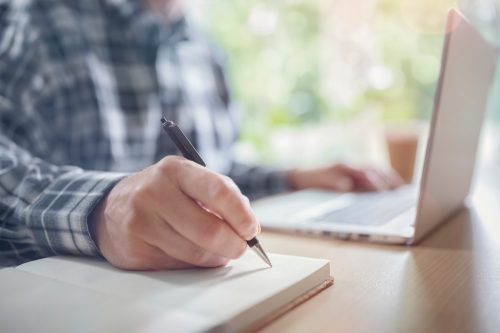
At the end of the day, write down what needs to get done the following day, as entrepreneur and Shark Tank investor Kevin O’Leary does. “Before I go to sleep, I write down three things that I have to get done the next morning,” he told Entrepreneur. “What I found was once you get those three things done, the rest of your day becomes amazingly productive.”
Haselberger promotes a similar strategy. “If you spend the last 10 minutes of your day making a realistic plan for the following day, you can actually mentally disconnect from work on evenings and weekends, AND you can avoid having to muster up a lot of activation energy to just get going in the morning.”
- Source: https://journals.plos.org/plosbiology/article?id=10.1371/journal.pbio.3001571
- Source: https://www.apa.org/topics/research/multitasking
- Source: https://www.researchgate.net/publication/235275530_Exercising_at_work_and_self-reported_work_performance
- Source: https://www.tandfonline.com/doi/full/10.1080/08959285.2015.1021049
- Source: https://www.ncbi.nlm.nih.gov/pmc/articles/PMC5451949/
- Source: https://journals.sagepub.com/doi/abs/10.1177/1948550615579462
- Source: https://www.sciencedirect.com/science/article/abs/pii/S0747563214005810
- Source: https://www.ics.uci.edu/~gmark/chi08-mark.pdf